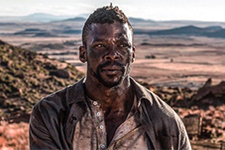Five Fingers for Marseilles
|  The title of Five Fingers for Marseilles refers to a group of adolescent boys and one girl who live in the remote, rugged hills of the Eastern Cape of Apartheid-era South Africa and imagine themselves to be a heroic resistance against their white oppressors, particularly the police officers who come into their small town and harass them and the others who live there. The “five fingers” live in Railway, which is a shantytown for blacks adjacent to Marseilles, the town that sprung up along the railroad and, like many South African towns at the time, was named for a major European city. The kids, who we first meet standing in a circle with slingshots self-consciously playing out a duel scenario right out of The Good, the Bad, and the Ugly (1966), restrict themselves to sticks and bottles until two police officers take one of their group, which leads Tau, the strongest and most violent member, to shoot and kill the officers, after which he must leave town. We then cut to 20 years later, where we learn that Apartheid has ended, but violence and animosity has not. Tau (Vuyo Dabula), having spent the past two decades as a rebel on the run and having just been released from doing hard time for robbery, returns to Railway, swearing off bloodshed and vowing to lead a quiet life. Such is not to be, as he finds himself embroiled in a new set of injustices, some of which are transpiring under the auspices of a member of the “five fingers,” Bongani (Kenneth Nkosi), who is now the mayor of Marseilles and promises to rebuild its fortunes. Unfortunately, such work invites all nature of corruption and violence, which Bongani cedes to Luyanda (Mduduzi Mabaso), another member of the “five fingers” who is now the town’s vicious police chief, and Sepoko, also known as Ghost (Hamilton Dhlamini), an amoral gangster who knows how to step into a power vacuum and exploit it. Like many a reluctant gunslinger, Tau is drawn back into the fight against his will, partially because of his feelings for Lerato (Zethu Dlomo), the only female member of the group who runs the town’s beloved tavern with her aged father and who now has a young, impressionable son, Sizwe (Lizwi Vilakazi). Director Michael Matthews and screenwriter Sean Drummond spent years bringing this film to life. Their dedication to its vision of using the genre tropes of the classical western as reinterpreted through the more morally ambiguous lens of the so-called spaghetti westerns by the likes of Sergio Leone, Sergio Corbucci, Ferdinando Baldi, Enzo G. Castellari, Joaquín Luis Romero Marchent, and Tonino Valerii, to explore the fraught racial and economic politics of post-Apartheid South Africa is impressive. The idea of a contemporary South African western sounds a bit gimmicky on paper, but Matthews and Drummond are clearly committed to using the narrative framework and instant iconography of the well-worn genre in ways that make them feel new again. The idea of making an “African western” is not entirely new—Five Fingers is predated by Nigerien director Moustapha Alassane’s short film Le Retour d’un Aventurier (The Return of an Adventurer, 1966), South African director Tonie van der Merwe’s Umbango (1986), Senegalese director Djibril Diop Mambéty’s Hyenas (1992), and Chad director Mahamat-Saleh Haroun’s Daratt (aka Dry Season, 2006)—but it is a rare enough occurrence that it can make a substantial claim to being novel. Of course, it helps that Matthews is a skillful director who, in working with cinematographer Shaun Lee, knows how to make a landscape reverberate with both narrative tension and metaphorical weight. All those widescreen vistas are simultaneously beautiful and forlorn, inviting and threatening, which aptly describes Five Fingers for Marseilles’ careful balance between cynicism and hope. Tau’s redemption is very nearly mythical, and he suffers through some Passion-like torment and bloodshed before emerging as a full-on hero of justified retribution, which means that the film plays its genre thrills for maximum, visceral enjoyment while also constantly reminding us of the real-world horrors of any culture emerging from decades of devastating racial injustice and violence. Copyright © 2017 James Kendrick Thoughts? E-mail James Kendrick All images copyright © Uncork’d Entertainment |
Overall Rating: 


 (3.5)
(3.5)


